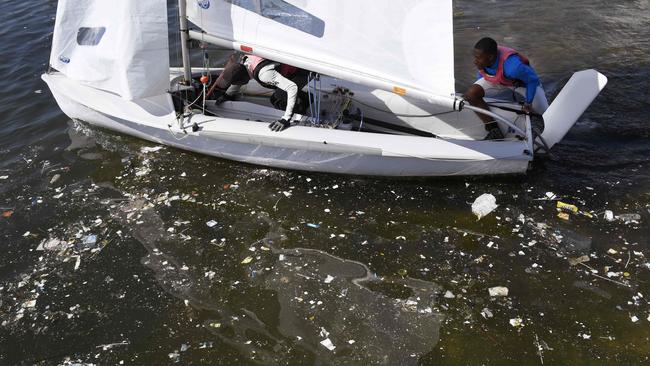Olympics: blame it on Rio as Games awash with filth
Games sites passed safe for swimming by WHO have been found to be contaminated with sewage, bacteria and garbage.

Athletes using Olympic water sport venues are taking extraordinary precautions as sites passed safe for swimming by the World Health Organisation were found to be contaminated with sewage, bacteria and garbage.
Officials moving sailing or rowing boats are using gloves, medical staff are on standby to treat any cuts, and athletes, who have been urged not to open their mouths if they fall in, are showering after leaving the water.
The measures come as a 16-month testing program commissioned by the Associated Press showed 1400 athletes, including open-water swimmers, risked illness, and tourists on Copacabana beach “face potentially serious health risks”.
Associated Press’s first tests in March last year showed 1.73 billion adenoviruses per litre at the Olympic rowing lagoon. Follow-up tests in June showed the number had fallen to 248 million per litre, still considered high.
The Gap investigation found that infectious adenovirus readings — tested with cell cultures and verified with molecular biology protocols — turned up at almost 90 per cent of the test sites over 16 months of testing. “That’s a very, very, very high percentage,” said Valerie Harwood, chairwoman of the Department of Integrative Biology at the University of South Florida. “Seeing that level of human pathogenic virus is pretty much unheard of in surface waters in the US. You would never, ever see these levels because we treat our wastewater.”
The World Health Organisation had tested Olympic water venues in Guanabara Bay consecutively for 60 days and deemed them safe on the basis of bacterial testing, not viruses.
The shock test results came to light as Rio prepared for Saturday’s opening ceremony with a full dress rehearsal in front of 30,000 spectators and as more Australian athletes arrived in Rio, with the men’s hockey team yesterday visiting the Christ the Redeemer statue.
Olympic officials are hoping for sunny skies to keep pollution in Olympic water venues down.
“Rain is the problem,” said Nebojsa Nikoli, chief medical officer of World Sailing in charge of health at the Rio Olympic venue at Guanabara Bay. “We don’t want rain.”
The international federation, World Sailing, is taking no chances, executive director Andy Hunt said: “We have contingency plans B, C, D, E, F and G,” most of them based on changing any of the seven race courses for the Games in the case of adverse wind, rain and tide that may quickly change pollution levels.
At present, a helicopter hovers overhead to spot floating debris to direct the 16 Eco boats to help mop up any problem areas; better drainage and partly modified sewage outfalls have assisted with reducing what was an extremely high bacteria count.
Australian London Olympics gold medallist Nathan Outteridge says the situation is much improved from a test event earlier this year where he had to go through sewage to launch his boat: “The biggest change is that I don’t have to wade past a sewage outlet in the marina to launch the boat. They have been able to redirect that pipe or turn it off.’’
At the nearby rowing venue, Australian manager Ray Ebert said environmental reports were being issued every 48 hours, monitoring a range of issues around water quality. He said the team was trying to reduce all risks, which included washing the boats before and after training and having water and food in ziplocked bags. After training and racing, the athletes wash their hands and faces and swill their mouths with mouthwash.
“The rowers have to deliberately stop and take care when they are eating or drinking on the water,’’ he said.
Australian chef de mission Kitty Chiller said the teams on the water were “just getting on with it’’ using strict health and hygiene protocols.
Four members of the Australian women’s water polo team were last night in quarantine after contracting gastroenteritis.
Additional reporting: wire services





To join the conversation, please log in. Don't have an account? Register
Join the conversation, you are commenting as Logout